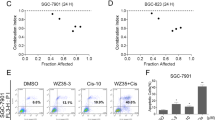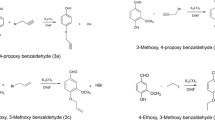Abstract
Introduction
Curcumin is a polyphenolic natural compound, which has demonstrated to possess antioxidant, anti-inflammatory, and anticancer effects in vitro & in vivo. However, its applicability in cancer therapy has been limited due to its poor cellular uptake. Here, we aimed to evaluate the anticancer effect of novel gemini curcumin (Gemini-Cur) on the gastric cancer AGS cells.
Method
The AGS cancerous and HFF-2 non-cancerous cells were treated with Gemini-Cur and curcumin (Cur) in a time- and dose-dependent manner. Cellular toxicity was studied using MTT, fluorescence microscopy, annexin V/FITC, and cell cycle assays. Additionally, real-time PCR and western blotting were employed to evaluate the expression of Bax, Bcl-2 and survivin genes.
Results
Our data indicated that Gemini-Cur is significantly taken into AGS cells compared to Cur. Moreover, the viability of Gemini-Cur treated cells was significantly reduced in a time- and dose-dependent manner (p < 0.001). Gemini-Cur compound induced G2/M cell cycle arrest that was followed by apoptosis in a time-dependent manner (p < 0.0001).
Discussion
Taken together, our findings support the idea that Gemini-Cur has the potential to be considered as an anticancer agent.





Similar content being viewed by others
Data Availability
Not applicable.
Code availability
Not applicable.
References
Siegel RL, Miller KD, Jemal A (2019) Cancer statistics, 2019. CA Cancer J Clin. https://doi.org/10.3322/caac.21551
American Cancer Society (2015) Chemotherapy Drugs : How They Work Understanding the life cycle of a cell. Am Cancer Soc. 22:10
Broekman KE, Reyners AKL, Touw DJ et al (2018) 992PPhase Ib study of metformin in combination with carboplatin/paclitaxel chemotherapy in patients with advanced epithelial ovarian cancer. Ann Oncol. https://doi.org/10.1093/annonc/mdy285.199
Tomasello G, Ghidini M, Liguigli W et al (2016) Targeted therapies in gastric cancer treatment: where we are and where we are going. Invest New Drugs 34:378–393. https://doi.org/10.1007/s10637-016-0330-2
Gaballu FA, Abbaspour-Ravasjani S, Mansoori B et al (2019) Comparative of in-vitro evaluation between erlotinib loaded nanostructured lipid carriers and liposomes against A549 lung cancer cell line. Iran J Pharm Res. https://doi.org/10.22037/ijpr.2019.1100775
Abedi-Gaballu F, Dehghan G, Ghaffari M et al (2018) PAMAM dendrimers as efficient drug and gene delivery nanosystems for cancer therapy. Appl Mater Today 12:177–190
Adiwidjaja J, McLachlan AJ, Boddy AV (2017) Curcumin as a clinically-promising anti-cancer agent: pharmacokinetics and drug interactions. Expert Opin Drug Metab Toxicol 13(9):953–972
Ah Seo J, Kim B, Dhanasekaran DN et al (2016) Curcumin induces apoptosis by inhibiting sarco/endoplasmic reticulum Ca2+ ATPase activity in ovarian cancer cells. Cancer Lett. https://doi.org/10.1016/j.canlet.2015.11.021
Chaudhari PD, Kendre PN (2015) Emerging trend in adressing the challenges to oral nanocurcumin delivery to improve quality of life of patients suffering from cancer. Indian Drugs 52:21
Xie M, Fan D, Zhao Z et al (2015) Nano-curcumin prepared via supercritical: Improved anti-bacterial, anti-oxidant and anti-cancer efficacy. Int J Pharm. https://doi.org/10.1016/j.ijpharm.2015.11.016
Hong Y, Che S, Hui B et al (2019) Lung cancer therapy using doxorubicin and curcumin combination: Targeted prodrug based, pH sensitive nanomedicine. Biomed Pharmacother 112:108614. https://doi.org/10.1016/j.biopha.2019.108614
Al ayoub Y, Gopalan RC, Najafzadeh M et al (2019) Development and evaluation of nanoemulsion and microsuspension formulations of curcuminoids for lung delivery with a novel approach to understanding the aerosol performance of nanoparticles. Int J Pharm. https://doi.org/10.1016/j.ijpharm.2018.12.042
Zhu M, Zheng Z, Huang J et al (2019) Modulation of miR-34a in curcumin-induced antiproliferation of prostate cancer cells. J Cell Biochem 120:15616–15624. https://doi.org/10.1002/jcb.28828
Kunnumakkara AB, Bordoloi D, Harsha C et al (2017) Curcumin mediates anticancer effects by modulating multiple cell signaling pathways. Clin Sci 131:1781–1799
Reuter S, Eifes S, Dicato M et al (2008) Modulation of anti-apoptotic and survival pathways by curcumin as a strategy to induce apoptosis in cancer cells. Biochem Pharmacol 76:1340–1351
Kunnumakkara AB, Anand P, Aggarwal BB (2008) Curcumin inhibits proliferation, invasion, angiogenesis and metastasis of different cancers through interaction with multiple cell signaling proteins. Cancer Lett 269:199–225
Aggarwal BB, Deb L, Prasad S (2015) Curcumin differs from tetrahydrocurcumin for molecular targets, signaling pathways and cellular responses. Molecules 20(1):185–205
Kawasaki T, Kawai T (2014) Toll-like receptor signaling pathways. Front Immunol 5:461
Zhu Y, Bu S (2017) Curcumin induces autophagy, apoptosis, and cell cycle arrest in human pancreatic cancer cells. Evidence-based Complement Altern Med. https://doi.org/10.1155/2017/5787218
Sahu RP, Batra S, Srivastava SK (2009) Activation of ATM/Chk1 by curcumin causes cell cycle arrest and apoptosis in human pancreatic cancer cells. Br J Cancer. https://doi.org/10.1038/sj.bjc.6605039
Yin L, Meng Z, Zhang Y et al (2018) Bacillus spore-based oral carriers loading curcumin for the therapy of colon cancer. J Control Release 271:31–44. https://doi.org/10.1016/j.jconrel.2017.12.013
Batra H, Pawar S, Bahl D (2019) Curcumin in combination with anti-cancer drugs: A nanomedicine review. Pharmacol Res 139:91–105
Karimpour M, Feizi MAH, Mahdavi M et al (2019) Development of curcumin-loaded gemini surfactant nanoparticles: Synthesis, characterization and evaluation of anticancer activity against human breast cancer cell lines. Phytomedicine 57:183–190. https://doi.org/10.1016/j.phymed.2018.11.017
Menger F, Littau C (1993) Gemini surfactants: a new class of self-assembling molecules. J Am Chem Soc 115:10083–10090
Aleandri S, Bonicelli MG, Giansanti L, Giuliani C, Ierino C, Mancini G, Martino A, Scipioni A (2013) A DSC investigation on the influence of gemini surfactant stereochemistry on the organization of lipoplexes and on their interaction with model membranes. Chem Phys Lipid 165(8):838–844
Mishra S, Palanivelu K (2008) The effect of curcumin (turmeric) on Alzheimer’s disease: An overview. Ann Indian Acad Neurol 11:13
Jacob A, Wu R, Zhou M, Wang P (2007) Mechanism of the anti-inflammatory effect of curcumin: PPAR-γ activation. PPAR Res 2007:1–5
Yallapu MM, Gupta BK, Jaggi M, Chauhan SC (2010) Fabrication of curcumin encapsulated PLGA nanoparticles for improved therapeutic effects in metastatic cancer cells. J Colloid Interface Sci. https://doi.org/10.1016/j.jcis.2010.05.022
Moorthi C, Kathiresan K (2013) Curcumin-piperine/curcumin-quercetin/curcumin- silibinin dual drug-loaded nanoparticulate combination therapy: A novel approach to target and treat multidrug-resistant cancers. J Med Hypotheses Ideas. https://doi.org/10.1016/j.jmhi.2012.10.005
Wilken R, Veena MS, Wang MB, Srivatsan ES (2011) Curcumin: A review of anti-cancer properties and therapeutic activity in head and neck squamous cell carcinoma. Mol Cancer. https://doi.org/10.1186/1476-4598-10-12
Bar-Sela G, Epelbaum R, Schaffer M (2009) Curcumin as an anti-cancer agent: review of the gap between basic and clinical applications. Curr Med Chem. https://doi.org/10.2174/092986710790149738
Jurenka JS (2009) Anti-inflammatory properties of curcumin, a major constituent of Curcuma longa: A review of preclinical and clinical research. Altern Med Rev 14(2):141–153
Balogun E, Hoque M, Gong P et al (2003) Curcumin activates the haem oxygenase-1 gene via regulation of Nrf2 and the antioxidant-responsive element. Biochem J. https://doi.org/10.1042/BJ20021619
Infante MR, Pérez L, Morán MC et al (2010) Biocompatible surfactants from renewable hydrophiles. Eur J Lipid Sci Technol 112:110–121
Petros RA, Desimone JM (2010) Strategies in the design of nanoparticles for therapeutic applications. Nat Rev Drug Discov 9:615–627
Shang HS, Chang CH, Chou YR et al (2016) Curcumin causes DNA damage and affects associated protein expression in HeLa human cervical cancer cells. Oncol Rep. https://doi.org/10.3892/or.2016.5002
Hu A, Huang J-J, Zhang J-F et al (2017) Curcumin induces G2/M cell cycle arrest and apoptosis of head and neck squamous cell carcinoma in vitro and in vivo through ATM/Chk2/p53-dependent pathway. Oncotarget 8:50747–50760. https://doi.org/10.18632/oncotarget.17096
Ismail NI, Othman I, Abas F, Lajis NH (2019) Mechanism of apoptosis induced by curcumin in colorectal. Cancer 20:2454
Liu B, Bai Q-X, Chen X-Q et al (2007) Effect of curcumin on expression of survivin, Bcl-2 and Bax in human multiple myeloma cell line. Zhongguo Shi Yan Xue Ye Xue Za Zhi 15:762–766
Chen X, Duan N, Zhang C, Zhang W (2016) Survivin and tumorigenesis: Molecular mechanisms and therapeutic strategies. J Cancer 7:314–323
Acknowledgements
The authors would like to thank staff of molecular biology and genomics lab at University of Tabriz.
Funding
Not applicable.
Author information
Authors and Affiliations
Contributions
AE performed the experiments, analyzed data and co-wrote manuscript. EB conceived of the idea, supervised the research and co-wrote the paper. HJA analyzed the data and co-wrote the paper. MAH and AG advised expression studies. All authors discussed the results and contributed to the final manuscript.
Corresponding author
Ethics declarations
Conflict of interest
All authors declare that they have no conflict of interest.
Ethical approval
Not applicable.
Consent to participate
Not applicable.
Consent for publication
Not applicable.
Additional information
Publisher's Note
Springer Nature remains neutral with regard to jurisdictional claims in published maps and institutional affiliations.
Rights and permissions
About this article
Cite this article
Emami, A., Babaei, E., Nagishbandi, A. et al. Cellular uptake and apoptotic properties of gemini curcumin in gastric cancer cells. Mol Biol Rep 48, 7215–7222 (2021). https://doi.org/10.1007/s11033-021-06713-2
Received:
Accepted:
Published:
Issue Date:
DOI: https://doi.org/10.1007/s11033-021-06713-2




